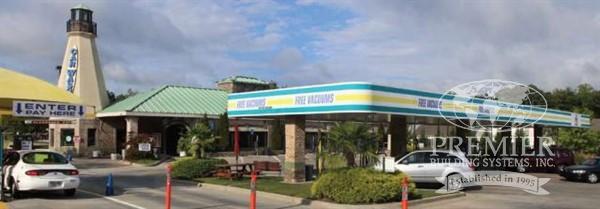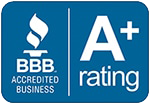We were recently the topic of a wonderful article written by Paul Deffenbaugh, who is the editorial director for Metal Construction News. We were so excited about it that we wanted to put the article on our own website. Here it is in its entirety. Enjoy!
A One-Two Punch
Premier Building Systems and Premier Construction Systems offer a combination approach to metal building distribution and construction

Scott Philips has built a one-two punch powerhouse in the metal building industry and he’s done so by developing strong, long-term relationships. In September 1995, he and a partner (who he later bought out and has since passed away) founded Premier Building Systems (PBS), a drop-ship metal building supplier that delivered pre-engineered buildings nationwide to a devoted group of contractors. Two years later, he founded Premier Construction Systems (PCS), a general
contractor serving Georgia and primarily offering metal building construction services.
Within six months of starting PBS, Philips leased rent-free a 4,000-square-foot building from a customer who couldn’t pay for and leased out 1,200 square feet. From that base he began growing the business.
After 18 months, he purchased a property on a main street in Lawrenceville, Ga., and built a 10,800-square-foot building, which stood two stories high for the first 17 feet then was one story. He occupied the top floor and leased out the lower level. He also built a 12,000-square-foot building next door and ran operations out of both buildings. The location, a main road in the middle of town, drew attention, and people began asking if he provided general contracting services. So, in fall 1998, in response to demand, he began PCS.
The results showed in the numbers. In 1999, PBS ranked 11th on the Metal Construction News Top Metal Builder list. In 2000, it rose to seventh and in 2001 moved up to fifth.
Building Relationships
That kind of growth and success only comes from establishing strong relationships. One of the best has been between PBS and Hockley, Texas-based Schulte Building Systems. For more than 10 years, Schulte has private labeled pre-engineered buildings for PBS. Schulte president Fred Koetting says: “The fact is Scott is one of the best there is at private labeling because he’s been at it for 20 years. He knows how to run his business, he knows the rules and he’s learned the discipline over the years.” PBS was Schulte’s first private label customer and its only one for the first five years or so. “We went to Scott because he’s honest and that’s the most important thing,” says Koetting.
Private labeling, for Schulte, meets the demands of a customer-the small contractor-that it is difficult for the manufacturer to serve. “Dealing with end users is a skill,” Koetting says. “We train our people to sell dealers. Your sales people have a hard time spending time even with the small contractors. That’s what the private label people have trained their people to do.”
 At PBS, the relationship-building process starts with a lead from a customer. “We get about 250 to 300 leads a month,” Philips says. He has eight construction advisors who work with customers to meet their needs. The consultants used proprietary Schulte software to design and price the building, then place the order. “Once the order is generated,” Philips says, “we send it to the steel mill. Drawings are usually done in one to three weeks. And delivering is between four and 12 weeks.”
At PBS, the relationship-building process starts with a lead from a customer. “We get about 250 to 300 leads a month,” Philips says. He has eight construction advisors who work with customers to meet their needs. The consultants used proprietary Schulte software to design and price the building, then place the order. “Once the order is generated,” Philips says, “we send it to the steel mill. Drawings are usually done in one to three weeks. And delivering is between four and 12 weeks.”
All the construction advisors handle everything on a project from beginning to end, and the differentiator for PBS is the customer service. “We get about 80 percent of our business from repeat and referral customers,” Philips says.
The best example of the value of customer service is the way the project is delivered. “The thing that I try to do is coordinate the building, insulation and doors, and get it all to the site to be as easy as possible for the customer.” Long-time door partner, Janus Doors, Temple, Ga., sends the door order to Schulte so that everything is loaded onto the same truck. The contractor only needs to coordinate with the insulation to have a complete package. “The challenge is coordinating it all to make delivery easier for the customer to handle,” says Philips.
That kind of differentiation doesn’t arrive in a vacuum and requires multiple parties to make it work. That’s where the relationship building comes in. “The success has been that I’ve managed to keep relationships with my manufacturers, and the loyalty on both sides of that have allowed me to improve on my product every year, ” says Philips.
Contracting Services
After he receives the request to build a building, Philips pursues the opportunity to offer general contractor and design-build services through PCS. The company is entirely separate with only Philips and back office staff working in both companies. But, as with PBS, the companies share a common culture.
The contracting side of the business does predominantly metal buildings, including erecting services, but also offers all the regular general contracting services, including site work, concrete, plumbing, electrical, etc. The staff takes on both commercial and residential projects.
“We’ve created a family atmosphere,” says Philips. “We’re all passionate about what we do. I don’t micromanage, but I do hold everybody accountable.” Employees in both firms are rewarded with bonuses for excellence, with the bonuses geared to the specific successes of their jobs and requirements.
Of his own devotion, when asked how much time he allocates to each business, Philips says with a laugh, “I’m 100 percent in both of them.”
Most of the staff at PBS and PCS has been there for more than 10 years, with the most recent hire having been on board for three years. Of course, people do leave, and often, Philips says, they have started their own companies. Unlike many business owners, Philips doesn’t resent this, but sees it as a natural part of doing business. He has also taken these opportunities to re-evaluate his own business and check that he’s on the right track. After one departure, he says, “I’ve taken it back to the way Premier did business the first 10 years.” He felt they had moved away from long-term relationships and were angling more for the best pricing and the best deals. “We’re not trying to buy the cheapest thing,” he says.
The Future
Re-establishing paradigms that were established in the first years of the business does not mean that PBS or PCS are not keeping up with the times. PBS has developed an online site that allows metal building buyers to get all the information they need and be able to specify their buildings completely. He cautions that there may be limits to online communication in metal building markets. “I don’t think people will buy a building online,” he says. “I tested a model with pricing online. All it did was put my pricing out there for my competitors. The new generation will force us to be ready for online, though.”
Establishing online communication gives his buyers the flexibility that works for them. They don’t have to call into PBS 10 times to get answers or communicate, and they don’t need to wait for someone to be in the office for the project to move forward. It is the same kind of relationship and flexibility that PBS has with Schulte Building Systems.
Koetting says: “His people learn to use the tools we offer-pricing and design-and we, in turn, work on what we provide and learn the types of products he likes to sell. It’s pretty much seamless.”
In the 20 years PBS has been in business, the metal building industry has changed significantly, and not just with the advent of online communication between supplier and buyer, and supplier and manufacturer. What’s changed the most? “The complexity of the projects,” says Philips. “Architects are starting to figure out they can do more with pre-engineered buildings.”
On the regulation side, he points to the requirements by municipalities and other governing bodies to require general contractors to be involved in construction so that building owners can’t work as their own general contractors. That can, potentially, dampen sales for metal building systems, which compete on the ease and speed of construction, but opens opportunities for PCS.
To match those threats, Philips engages in an exercise where he prices competing systems. “If I’m going to be in this industry, I have to know what’s going on,” he says. He takes the same project and prices it out in wood, block, structural steel and concrete tilt-up. “I estimate the same building with different structural materials.”
That knowledge and bit of research, keeps him in a stronger competitive position. With long-term relationships with his suppliers and deep tenure among his staff, Philips can count on the support and backing necessary to weather industry threats. At the same time, the people he works with can count on his loyalty.
Company Profile
Year Founded:September 1995
Location:Lawrenceville, Ga.
Metal Building Affiliation:Schulte Building Systems, Hockley, Texas
Geographic Areas of Service:National for building systems sales; Georgia for contracting services
Services Offered:Drop-ship pre-engineered metal buildings for PBS. Turnkey general contracting within Georgia for PCS
Number of Employees:14
2015 Revenue Projection:Approximately $12 million
2014 Tonnage Shipped:3,880 Tons
PCS Staff:
Scott Philips, Owner and President
Gary Dunn, Projects Manager
Craig Zimmer, Superintendent
Adam Strong, Estimating
J.T. Philips, Estimating
Chad Smith, Site Maintenance Coordinator
PBS Staff:
Scott Philips, Owner and President
Danny Garrett, Senior Construction Advisor
Blake Wilson, Construction Advisor
Jason Arrowood, Construction Advisor
Eddie Glausier, Construction Advisor
Trevor Greene, Construction Advisor
Eddie Mason, Construction Advisor
Premier Building Systems has served business owners and private residents throughout the south for more than 20 years. We provide a variety of metal buildings including metal retail construction buildings in Gulfport, Alabama, steel buildings used for offices in Jacksonville, Florida, a metal horse barn in Louisville, Kentucky, a steel building garage outside of Norfolk, Virginia, and so much more. If you can build it with traditional construction methods, you can build with a metal building!


